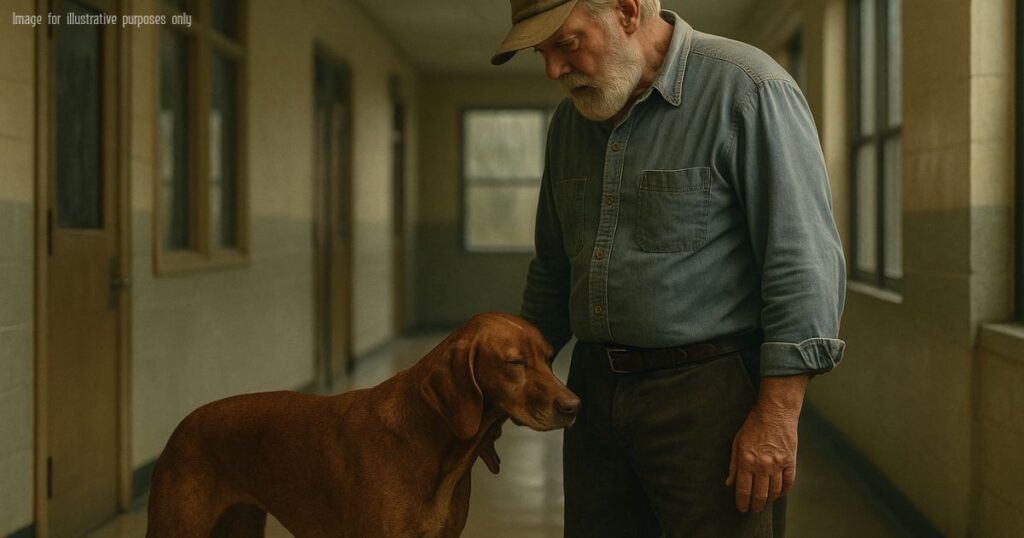PART 5 — The Storm Beneath the Floorboards
The first snow fell in the early hours of Friday morning.
Light, quiet, and unexpected.
By noon, it was a blizzard.
Parents were calling the front office in a panic. The principal cut the school day short. But buses were delayed, and power flickered twice in the west wing. Kids sat in clumps by the gym, wrapped in spare coats from the lost and found.
Cliff Rowley knew this building better than most.
He knew it would hold.
Still, he walked the halls, flashlight clipped to his belt, bell jingling with each step, checking pipes and doors and emergency blankets.
Then he saw Jeremy.
Alone in the corner of the nurse’s office, coat zipped to his chin, clutching Button’s leash like it was a lifeline. The nurse was busy triaging another student with a sprained ankle.
Cliff crouched beside him.
“You okay, kid?”
Jeremy nodded, but his jaw was tight.
“Your mom on her way?”
A pause. Then, quietly: “Car broke.”
Cliff exhaled.
“Well,” he said, “until she gets here, you stick with me. Deal?”
Jeremy didn’t speak.
But he stood.
And Button followed.
They waited out the storm in the janitor’s workroom—warmest spot in the school thanks to a stubborn old radiator Cliff had re-rigged last winter. He handed Jeremy half a peanut butter sandwich from his thermos bag and poured water into a chipped bowl for Button.
Jeremy sat on an overturned bucket, eating in tiny, neat bites.
Button dozed with her head on his boot.
“I used to be scared of storms,” Cliff said after a while. “Not the weather kind. The kind that started inside. The kind no one else could hear.”
Jeremy didn’t answer, but his hand curled tighter in Button’s fur.
“When I got locked up, they put me in a cell alone for three nights. No windows. No clock. Just a concrete box and what I’d done.”
He looked at the boy.
“Sometimes the storm doesn’t stop. It just gets quieter. You learn how to walk through it.”
A long silence followed.
Then Jeremy whispered, “I hear things at night.”
Cliff nodded. “What kind of things?”
“My dad yelling,” the boy said. “Even when he’s not there.”
The room was very still.
Cliff looked at Button, who didn’t move—just opened one eye, slow and soft.
“You know what she used to do for me?” Cliff said. “When I couldn’t sleep?”
Jeremy looked up.
“She’d lie real close. So I could feel her breathing. That’s all. Just breathing. Let me know I wasn’t the only one still alive.”
The boy said nothing.
But he got off the bucket and sat beside Button on the floor.
Laid his cheek on her back.
And breathed.
Outside, the wind shrieked like it had bones to rattle.
Inside, the room held steady.
Jeremy fell asleep not long after. Cliff sat nearby, watching the snow swirl through the barred windows, hands wrapped around a chipped ceramic mug filled with stale coffee.
That’s when he saw the envelope.
It was tucked in the back of his supply drawer, behind a cracked fuse tester and a rubber door wedge.
Yellowed, unsealed.
He knew the handwriting.
Warden J.P. Fielding
Subject: Final Discharge / Rowley, Clifford (Inmate #602-15)
He hadn’t looked at it in years.
But tonight, he opened it.
Inside, two pages.
One listed the terms of his release.
The other—a short letter, hand-signed.
Mr. Rowley,
I don’t know what you’ll do with your freedom. I can’t tell you how to live.
But I want you to know something: that dog you trained—Sally—she passed every test with the highest marks.
The evaluator said she was “calmer than most of the humans in the room.”
You didn’t just train her.
You taught her to trust again. That means someone taught you first.
Don’t waste it.
– J.P. Fielding, Warden*
Cliff stared at the letter for a long time.
Then he folded it, slipped it into his pocket, and sat beside the boy and the dog.
And breathed.
When Rachel Flint finally arrived—pale, breathless, snow in her hair—she paused in the doorway at the sight of the three of them.
Jeremy sleeping, his hand tangled in Button’s ear.
Cliff watching over them with a stillness that said he belonged.
She didn’t say anything.
Just mouthed a quiet, “Thank you.”
And Cliff, for the first time in years, let himself believe he might be something more than a man who cleaned up after others.


